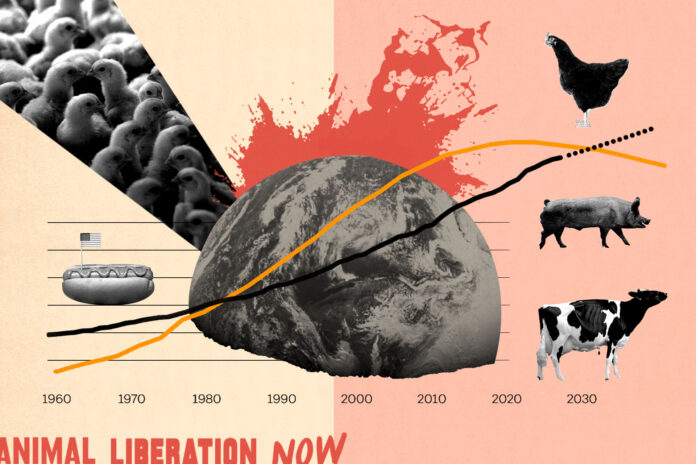What if we told you there was an easy way for humanity to reduce climate-warming emissions, help prevent the next pandemic, and at the same time eradicate the most significant moral atrocity of our time—one for which almost all of us bear some responsibility. ?
We are of course talking about factory farming. In 2024, it’s hardly a secret that billions of animals raised for food are treated terribly. They are, to name just a few standard industrial practices, caged, mutilated without pain relief and bred so intensively that they are in chronic pain and often even struggle to stand before slaughter. painful.
The sheer scale of this system defies comprehension. Kills people every year 80 billion Land animals – 10 times more than humans on Earth – and an equal bigNumber of poorly tracked fish.
If the costs to animals weren’t bad enough, industrial animal agriculture also poses a danger to us: it fuels antibiotic resistance and threatens zoonotic diseases that keep scientists up at night. It’s a huge environmental liability, emitting what researchers estimate to be between 14 percent and 20 percent of global greenhouse gas emissions and more. One-third of the planet’s habitable land.
Yet factory farming continues to expand its reach around the world, despite decades of efforts by animal advocates to stop it, because it is the most efficient way to produce plenty of meat for a world of 8 billion people.
We think there is a better way. This week, Future Perfect is releasing How Factory Farming Ends A package of stories about the past and future of the movement against factory farming; the struggle to change our culture, politics and palate; And how it can still be real progress. The series is supported by animal charity Assessors, which received a grant from the Builders Initiative.
Some of the stories delve into the animal rights movement’s fraught relationship with the climate and public health communities and the potential for building meaningful alliances. Others scrutinize the animal rights movement from its glory days in the 19th century, when vegetarianism was popular among utopian social reformers, to its present-day isolation from other progressive causes, a messy, often frantic but essential legacy of human treatment of morality. Animals (PETA).
Our hope is that these stories will challenge policy leaders and the public at large to envision a kinder, healthier, truly sustainable food system.
–Marina Bolotnikova, Deputy Editor, Future Perfect

Humanity is failing its greatest moral test
A long, frantic, glorious, important struggle against factory farming.
by: Marina Bolotnikova

The world’s most powerful environmental groups help greenwash the Big Meat’s climate impact
Organizations like the World Wildlife Fund are laundering the Big Meat campaign At what cost?
by: Kenny Torella

If the Left is serious about defending democracy, there is one more reason to add to the list
Animal rights should become a key issue for progressives.
by: Astra Taylor and Sunaura Taylor

The best way to get out of factory farming is to have nothing to do with animals
We need a grand coalition to get people away from factory farming.
by: Jonathan Safran Foer and Aaron Gross

You are wrong about PETA
Nonprofits are a punchline. It has forced the world to confront factory farming and animal exploitation. Coming up on Thursday 8th August.
by: Jan Dutkiewicz

Vegans are fundamentalists. That’s why we need them
Society is at war with animals. Vegans are dissenters. Coming up on Thursday 8th August.
by: Jishnu Guha-Majumdar

I am a black vegan. Why don’t you see more of us?
People of color are more likely to be vegetarians. But the animal rights movement is still white-faced. Coming up on Thursday 8th August.
by: Noella Williams

The American government built the meat industry. Now can it build a better food system?
The plant-based protein movement goes to Washington. Coming Friday, August 9.
by: Kenny Torella

19th century animal rights activists had a lot of moxie. Here’s how to get it back.
The meat industry has taken away your food options and made workers the enemy. It doesn’t have to be that way. Coming Friday, August 9.
by: Crystal Heath

The animal rights movement was once mired in bitter controversy. Now it’s getting things done.
A brief history of effective animal advocacy. Coming Friday, August 9.
by: Kelsey Piper
Credit
Editorial Lead: Marina Bolotnikova
Project managers: Marina Bolotnikova and Elizabeth Price
Editor: Marina Bolotnikova, Izzy Ramirez, Dylan Scott, Brian Walsh
Story Format Editor: Easy Ramirez
Reporter: Marina Bolotnikova, Jan Dutkiewicz, Jonathan Safran Foer, Aaron Gross, Jishnu Guha-Majumder, Crystal Heath, Kelsey Piper, Astra Taylor, Sunaura Taylor, Kenny Torella, Noella Williams
Art Director: Paige Vickers
Artist: Mark Harris, Sue Co
Style and Standards/Fact-Checker: Colleen Barrett, Elizabeth Crane, Ank Dussaud, Kim Eggleston, Melissa Hirsch, Kelsey Lannin, Caitlin Penzeimug, Sarah Schweppe
audience/com: Bill Carey, Gabby Fernandez, Shira Turlow, Kelsey Trinidad, Amani Orr
Editorial Director: Brian Walsh
special thanks: Nisha Chittal, Ocean Jaro, Lauren Katz, Swati Sharma, Paige Vega, Elbert Ventura
The series is supported by animal charity Assessors, which received a grant from the Builders Initiative.


